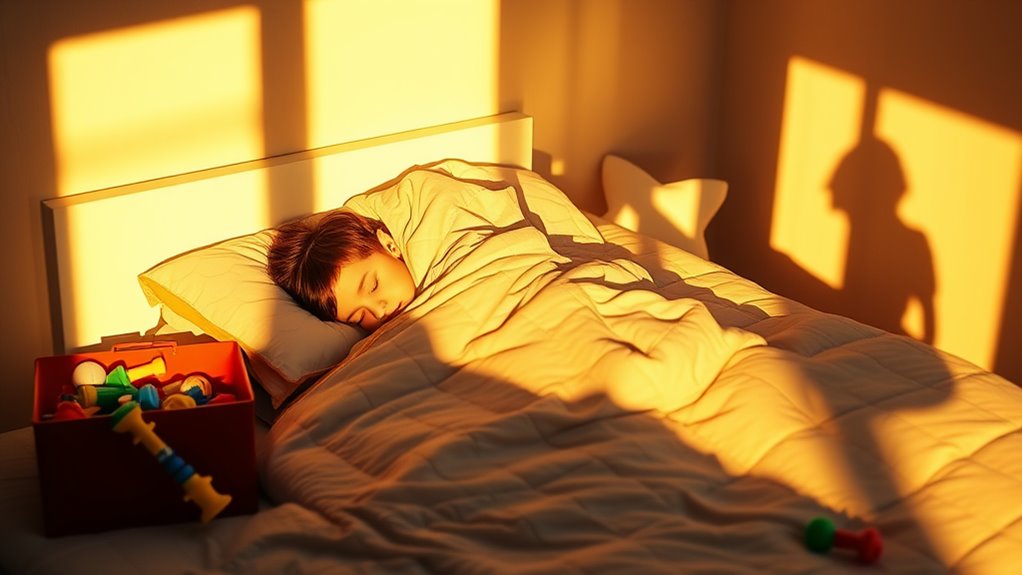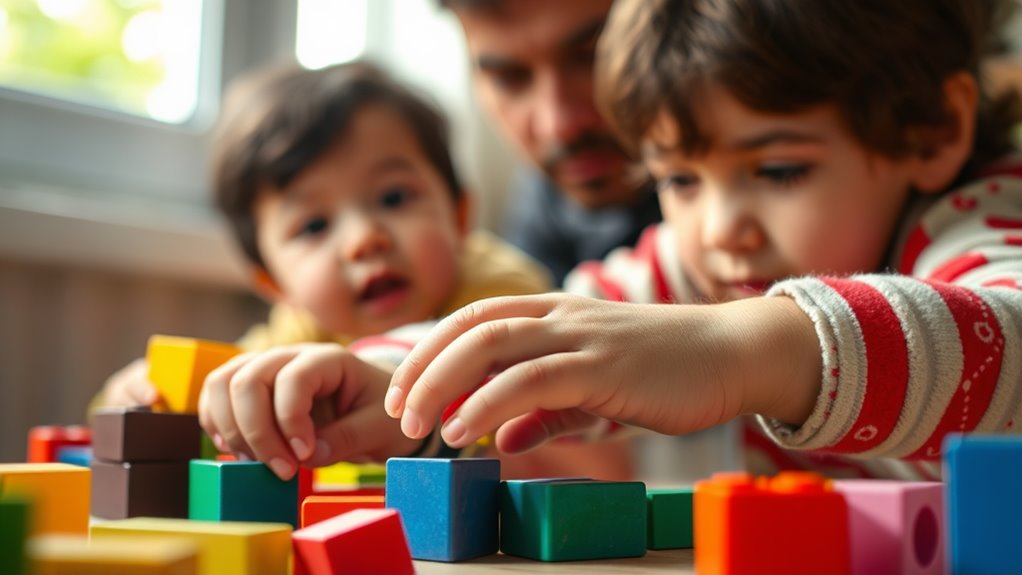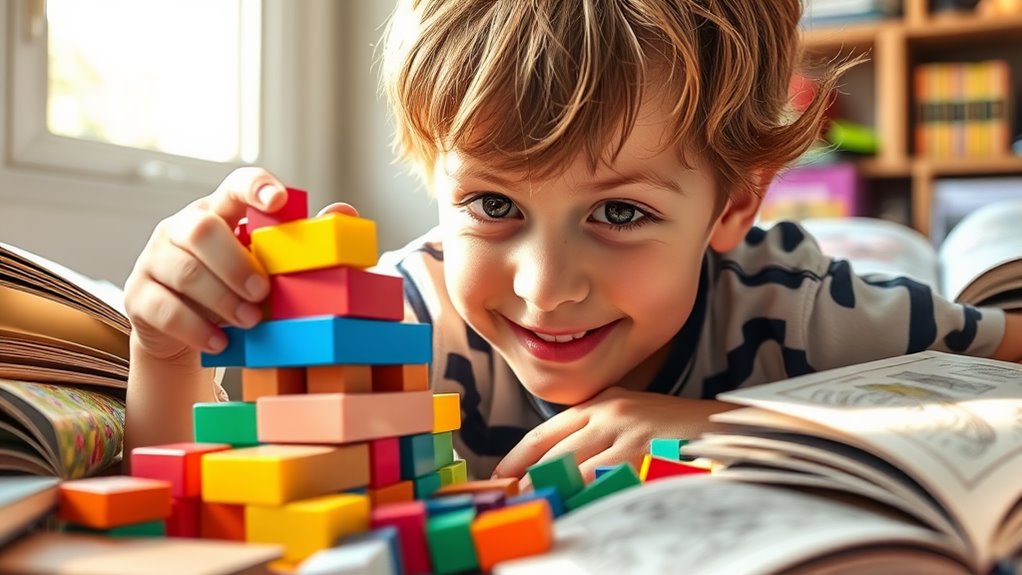The Connection Between Sleep and Your Child’s Behavior
Your child’s behavior is closely linked to their sleep patterns. When kids don’t get enough rest, they can become irritable, impulsive, and struggle to concentrate. This lack of sleep can also mess with their emotional regulation, leading to more meltdowns and difficulties in social interactions. On the flip side, well-rested children tend to focus better, improve academically, and develop healthier peer relationships. Establishing consistent sleep routines can significantly enhance their overall behavior and emotional well-being. If you’re curious about how to maximize your child’s sleep for better outcomes, there’s more to explore.
Key Takeaways
- Sleep deprivation can lead to irritability and increased impulsivity in children, affecting their behavior and interactions with peers.
- Inadequate sleep compromises emotional regulation, resulting in frequent meltdowns and difficulty coping with stress.
- Consistent sleep routines foster emotional resilience, helping children manage their feelings more effectively.
- Improved sleep enhances focus and attention, contributing to healthier learning habits and classroom behavior.
- Healthy sleep patterns promote positive social interactions, boosting children’s confidence and peer relationships.
Importance of Sleep in Development
Sleep plays a crucial role in a child’s development, as it directly impacts their physical, emotional, and cognitive growth. When your child gets adequate sleep, they’re not just resting; they’re actively supporting their child growth. Sleep is essential for the release of growth hormones, which are critical during the early years. This is when your child’s body is developing rapidly, and sleep facilitates this process.
Moreover, sleep is vital for cognitive development. During sleep, your child’s brain processes information, consolidates memories, and develops problem-solving skills. This means that a well-rested child is better equipped to learn and absorb new information, leading to improved performance in school and social interactions.
Lack of sleep can hinder these processes, making it harder for your child to focus, remember what they’ve learned, and manage their emotions effectively.
Ensuring your child has a consistent sleep routine can foster an environment where they can thrive, both physically and mentally. So, prioritize sleep as a cornerstone of your child’s development, paving the way for healthier growth and enhanced cognitive abilities.
Sleep Deprivation Effects on Behavior
When a child doesn’t get enough rest, the effects on their behavior can be significant and concerning. Sleep deprivation can lead to a range of behavioral issues, from irritability to difficulty concentrating. You might notice that your child becomes more impulsive or has trouble following directions. This can be particularly alarming, as these behavioral changes may mimic symptoms of various sleep disorders or other underlying conditions.
Lack of sleep affects a child’s ability to regulate emotions and respond to situations calmly. You may find that your child has more frequent meltdowns or struggles with conflicts, as they’re unable to cope with stress effectively.
Additionally, the impact of sleep deprivation can extend to their social interactions, making it harder for them to connect with peers. If left unaddressed, these behavioral issues can create a cycle of poor sleep and escalating problems.
It’s essential to recognize the connection between sleep and behavior, as improved sleep hygiene can lead to lasting positive changes. Ensuring your child gets enough quality sleep is crucial for their overall well-being and development.
Emotional Regulation and Sleep
During childhood, emotional regulation plays a crucial role in a child’s development, and its connection to sleep is undeniable. When your child doesn’t get enough sleep, it can significantly impact their ability to manage emotions.
Sleep cycles are essential for restoring emotional balance, as they help the brain process and store emotional experiences. Inadequate sleep disrupts these cycles, leading to increased irritability and difficulty coping with stress.
You might notice that when your child is well-rested, they’re better equipped to handle disappointments and challenges. This emotional resilience is vital for their overall well-being.
On the other hand, sleep deprivation can make it hard for them to calm down after a tantrum or to express feelings appropriately.
Encouraging consistent sleep routines can help your child develop healthier emotional responses. By prioritizing sleep, you’re not just helping them to feel more energetic; you’re also supporting their emotional regulation skills.
Focus and Academic Performance
A well-rested child not only manages emotions better but also shows improved focus and academic performance. When your child gets enough sleep, their attention span increases, allowing them to engage more deeply in lessons and absorb information effectively. This means they’re not just present in class; they’re actively learning.
With better focus, your child can develop healthier homework habits. They’re less likely to rush through assignments or get easily distracted by their environment. Instead of taking hours to complete a simple task, a well-rested child can tackle their homework efficiently, leading to a sense of accomplishment and reducing stress.
Moreover, sleep plays a crucial role in memory consolidation. When your child sleeps well, their brain processes and retains what they’ve learned during the day. This can translate into better grades and a more positive attitude towards school.
Simply put, ensuring your child gets enough sleep can be one of the best ways to support their academic journey. By prioritizing rest, you’re not just helping them today; you’re setting the foundation for their future learning and success.
Social Interactions and Sleep Quality
Sleep quality significantly influences a child’s social interactions, as well-rested kids tend to engage more positively with their peers. When your child has healthy sleep patterns, they’re more likely to approach social situations with enthusiasm and confidence.
On the flip side, if they’re sleep-deprived, they may become irritable, withdrawn, or even aggressive, making it harder for them to build and maintain peer relationships.
You might notice that your child struggles to read social cues or respond appropriately during playdates or school activities when they haven’t had enough rest. Poor sleep can lead to difficulty in regulating emotions, which can create misunderstandings and conflicts with friends.
This can result in your child feeling isolated or rejected, further impacting their self-esteem and social development.
Encouraging a consistent bedtime routine can help ensure your child gets the restorative sleep they need. By prioritizing good sleep hygiene, you’re not only supporting their overall well-being but also enhancing their ability to interact positively with others.
Frequently Asked Questions
How Can I Improve My Child’s Sleep Environment?
To improve your child’s sleep environment, ensure it’s dark, quiet, and cool. Consider adding calming scents like lavender or chamomile to promote relaxation. These adjustments can create a comforting space for better sleep.
What Are the Best Bedtime Routines for Children?
You might think chaotic bedtimes are the norm, but establishing calming activities like storytime rituals can transform your nights. Consistent routines help your child wind down, making bedtime a cherished experience instead of a battle.
Are There Sleep Aids Safe for Children?
When considering sleep aids for kids, it’s best to explore natural remedies first. Some sleep supplements, like melatonin, can be safe, but you should always consult with a pediatrician before trying anything new.
How Does Screen Time Affect Sleep Quality?
As the saying goes, “too much of a good thing can be bad.” Excessive screen time can lead to sleep disruption, making it harder for you to unwind and get quality rest when the day ends.
What Age Do Children Need the Most Sleep?
Children need the most sleep during infancy and early toddler years. Infants typically require 14-17 hours of sleep, while toddlers benefit from consistent naps, averaging 11-14 hours total, ensuring they’re well-rested and ready to explore.





